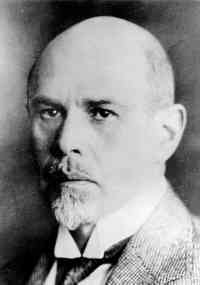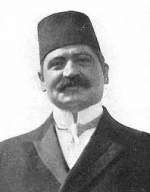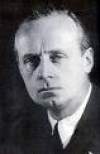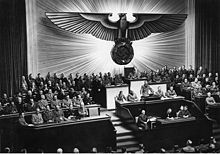
December 11 1838 Birth: Emil Rathenau: German industrialist and a leading figure in the early European electrical industry. In 1881, he met Thomas Edison in Paris at the international electricity exhibition. After lengthy negotiations, in 1882, he purchased the rights for the economic use of Edison's patents in Germany. He founded a company to manufacture them (which became one of the two largest German electrical enterprises, Allgemeine Elektrizitats Gesellschaft (AEG)-the German General Electric Company). The product range included power stations, railways as well as electrical machines and devices. Rathenau was also the first to produce aluminum in Germany for industrial use.
1882 Birth: Fiorello LaGuardia:
Fiorello LaGuardia chose not to wear his Jewish heritage on his sleeve. In fact, he allowed the public to identify him as Italian, not Jewish, even under the most tempting of political circumstances. When issues of Jewish interest came up in New York or national politics, however, the "Little Flower" was an ardent advocate for Jewish rights. As mayor of New York, he was one of Hitler's most outspoken opponents.
LaGuardia was born in Greenwich Village in 1882 to Achille Luigi Carlo LaGuardia, a Catholic, and Irene Luzzato Coen, who had been raised in an observant Jewish home in Trieste. In 1880, the couple emigrated to the United States. . . .
In 1916, running as a Republican, LaGuardia challenged the incumbent Congressman from the Lower East Side, a Tammany-backed saloonkeeper named Farley. Speaking to crowds in Yiddish, Italian and Serbo-Croatian, LaGuardia defeated Farley by a narrow margin, becoming the first Italian-American elected to Congress. In 1922, Tammany ran a Jewish candidate against LaGuardia and circulated a flyer calling LaGuardia "a pronounced anti-Semite and Jew-hater." Advised that he should publicly proclaim that his mother was Jewish, LaGuardia rejected the tactic as "self-serving." Instead, he challenged his opponent to debate him in Yiddish—an offer his opponent could not accept. LaGuardia won re-election.
Defeated for re-election in the Roosevelt landslide of 1932, LaGuardia successfully ran for mayor of the City of New York in 1933. Once in office, he became an implacable foe of Adolf Hitler and the Nazi regime. Before taking office, LaGuardia called Hitler a "perverted maniac." In a public address in 1934, LaGuardia warned, "Part of [Hitler's] program is the complete annihilation of the Jews in Germany." In 1937, speaking before the Women's Division of the American Jewish Congress, LaGuardia called for the creation of a special pavilion at the upcoming New York World's Fair: "a chamber of horrors" for "that brown-shirted fanatic."
In response, the government-controlled press in Germany called LaGuardia a "Dirty Talmud Jew," a "shameless Jew lout" and "a whoremonger." When the German ambassador protested LaGuardia's remarks to Cordell Hull, the U.S. Secretary of State, Hull explained to the ambassador that, personally, he "very earnestly deprecate[d] the utterances which have thus given offense to the German government." Hull had to explain, however, that in America the mayor of New York was free to speak his mind. Hull complained privately to President Roosevelt that LaGuardia was poisoning German-American relations, but Roosevelt asked Hull, "What would you say if I should say that I agreed completely with LaGuardia?" Several months later, LaGuardia visited Roosevelt and recorded the following scene: "The president smiled as I entered his office. Then he extended his right arm and said, 'Heil, Fiorello!' I snapped to attention, extended my right arm and replied, 'Heil, Franklin!' And that's all that was ever said about it."
In 1938, after the division of Czechoslovakia and Kristallnacht, LaGuardia stepped up his attacks on the Hitler regime. At a rally of 20,000 anti-Fascists in Madison Square Garden, LaGuardia proclaimed himself unable "adequately to describe the brutality of [Hitler] and his government" and called the Nazi regime a great threat to world peace. Historians David and Jackie Esposito have written, "In the face of large scale indifference to human rights violations abroad and growing isolationism at home . . . LaGuardia reasserted a Progressive's faith in the rule of reason and the power of enlightened public opinion to face up to the Nazis and confront Hitler." When the U.S. entered the war in 1941, LaGuardia's principled position was vindicated.
After the war, LaGuardia became the director general of the United Nations Relief and Rehabilitation Administration (UNRRA) from March 29, 1946 to January 1, 1947, where he joined in the efforts to feed the millions of displaced persons in the aftermath of World War II. In his role as director general, LaGuardia visited several DP camps in Europe.
LaGuardia died on September 20, 1947. [For further information, click here]
1890 Moltke on War: German Fieldmarshal Count Helmuth von Moltke on this day declares: Eternal peace is a dream--and not even a beautiful one. War is part of God's world order. Within it unfold the noblest virtues of men, courage and renunciation, loyalty to duty and readiness for sacrifice--at the hazard of one's life. Without war the world would sink into a swamp of materialism. 1914 World War I: Various: Dec 11-24 Gefreiter Adolf Hitler serves in the December battle in Flanders as a Dispatch Runner with Regimental HQ, 16 Bavarian Infantry Regiment. 1915 World War I: Various: Armenian Massacres From Talaat Pasha's Alleged Official Orders Regarding the Armenian Massacres: We are informed that some correspondents of Armenian journals are acquiring photographs and letters which depict tragic events, and these they give to the American Consul at Aleppo. Dangerous people of this kind must be arrested and suppressed. Yuan Shih-kai accepts Chinese throne:
With war raging in Europe, conflict also reigns in the Far East between two traditional enemies, Japan and an internally-divided China. On December 11, 1915, the first president of the new Chinese republic, Yuan Shih-kai, who had come to power in the wake of revolution in 1911 and the fall of the Manchu Dynasty in 1912, accepts the title of emperor of China.
Japan had declared war on Germany in August 1914, capturing the most important German overseas naval base at Tsingtao, on China's Shantung peninsula, by amphibious assault. In January 1915, Japan's imperialist-minded foreign minister, Kato Takaaki, presented China with the so-called 21 Demands, which included the extension of direct Japanese control over more of Shantung, southern Manchuria, and eastern Inner Mongolia and the seizure of more territory, including islands in the South Pacific controlled by Germany.
If accepted in their entirety, the 21 Demands would have essentially reduced China to a Japanese protectorate. Though Yuan, a former general and China's president since February 1912, when he succeeded Sun Yat-sen, founder of the Kuomintang (KMT) or Nationalist Peoples' party, was forced to accept all but the most radical of the demands, he attempted to use Chinese anger over them to justify his bid for restoring the monarchy and installing himself as emperor. Having already dismissed the Chinese parliament and expelled the KMT party from the government, he was now ruling through provincial military governors throughout the country. The return to monarchy was met by such strong opposition within and outside of China, including from some of those same military governors, that Yuan was quickly forced to return the country to the republican form of government. He died in 1916. (History.com)
1918 Birth: Alexander Solzhenitsyn—in Kislovodsk, Russia: He fought in WWII, but was arrested for criticizing Joseph Stalin and spent eleven years in labour camps and exile. His books, including The Gulag Archipelago, recount his experiences. He was awarded the Nobel Prize for Literature in 1970 and the Russian State Prize in 2007. Solzhenitsyn died in 2008. (Biography.com)
1937 League of Nations: Italy withdraws from the League of Nations. 1938 Memel: The Nazi Party wins election: The German community remained unreconciled throughout the decade and a half of Lithuanian rule. Martial law was imposed in 1926 and again in 1938. The National Socialists gained favor and anti-Semitism grew steadily during the 1930s. The Nazis won 26 of 29 seats on the local council in December 1938 elections and Memel's Jews began a mass exodus. 1938 Holocaust: Twenty-thousand Libyan Jews are deprived of their Italian citizenship. 1939 World War II: Memorandum by the Reich Foreign Minister Joachim von Ribbentrop: I. I asked the Russian Ambassador to see me today at 5 p.m. At the beginning of our conversation, I indicated to Herr Shkvartsev the inappropriateness of the report given out by the Tass agency yesterday, dealing with alleged armament supplies by Germany to Finland. I stressed the fact that this report had been denied yesterday by German sources. All the more did I regret that this report, apparently launched from English sources via Sweden and only designed to create discord between Germany and the Soviet Union, has been taken up in so striking a fashion by the official Russian agency. On the armaments business with Finland I made the following suggestions to him: 1) Germany had before the commencement of hostilities last summer contracted with Finland for the supply of certain anti-aircraft guns in exchange for nickel shipments from Finland. After the hostilities began, further shipments ceased. 2) The Italian Government had inquired in October whether Germany was willing to permit the transit of fifty aircraft to Finland. At that time the threat of military measures between Russia and Finland could not yet be foreseen. Therefore, the German Government had, to be sure, refused transit by air, but raised no objection to transit by rail. The Italian Government, however, did not refer to this matter again, and neither the Italians nor the Finns made requests for a transit permit for the planes. 3) Some time ago an application was made to ship certain war materials for Finland from Belgium through Germany. This application, too, had been rejected. I was now asking the Russian Ambassador to inform his Government of the foregoing and to point out that with publications such as the Tass report mentioned, only England's game was being played. England was behind Finland and according to intelligence received, England was also responsible for the failure of the Russo-Finnish negotiations last November. I should be grateful if the Russian Government would cause the Tass agency, before releasing such reports in the future, first to get in touch either with the German Embassy inMoscow or with Berlin, in order that such unpleasant incidents might be avoided. The Russian Ambassador showed appreciation of my viewpoint and promised to report to his Government accordingly. II. I then spoke to the Russian Ambassador about the extensive demands for military supplies put forward by the Russian trade delegation. I wanted to say beforehand, that I had given instructions to comply with the Russian requests in any conceivable way, within the limits of possibility. But it should not be forgotten that Germany was at war and that certain things were simply not possible. As I had since been told, a new basis had been found in the meantime, upon which the further negotiations can soon be concluded in Moscow, between the newly arrived Russian delegation and our negotiators. I asked the Russian Ambassador, however, to point out in Moscow, that from the German side everything humanly possible has been done and that beyond that one could not go. The Russian Ambassador promised to report to Moscow in this sense and stressed the point that from the Russian side any military information obtained here by the Russian delegation would, of course, be kept secret. I told the Russian Ambassador that we had complete confidence in the Russian promises, but it should be understood by the Russians that there was certain material that we could not supply during the war. 1940 World War II: Various Press Reaction to Hitler's Dec 10 Speech: He spoke in moderate tones. Hitler's remarks seem to have been designed chiefly for home consumption. There was no indication in his remarks today how long he expected the war to last. At the same time there was no indication that he expected it to be concluded in the immediate future. -- New York Times Press Reaction to Hitler's Dec 10 Speech: Instead of once more threatening Britain with annihilation by Nazi bombs, Hitler was at pains to emphasize the dire consequences to her 'should she attempt to again set foot on the continent the first time that he has publicly contemplated such a contingency. Few people in this country will quarrel with the statement that more is at stake in this struggle than victory of one country over another. It can only be because Hitler reads British policy in the light of his own designs that he predicts that the loss of the war by Germany will mean 'the end of the German people.' --The Times (London) 1941 Countdown to Infamy: Various: At 2.30 PM - four days after Pearl Harbor - Italy and Germany declare war on the United States. Poland declares war on Japan. Cuba, Costa Rica, Nicaragua, Dominican Republic and Guatemala all declare war on Germany and Italy. Hitler's Declaration Of War on the US to the Reichstag: But why is there now another President of the USA who regards it as his only task to intensify anti-German feeling to the pitch of war? National-Socialism came to power in Germany in the same year as Roosevelt was elected President. I understand only too well that a World-Wide distance separates Roosevelt's ideas and my ideas. Roosevelt comes from a rich family and belongs to the class whose path is smoothed in the Democracies. I am only the child of a small, poor family and had to fight my way by work and industry. When the Great War came, Roosevelt occupied a position where he got to know only its pleasant consequences, enjoyed by those who do business while others bleed. I was only one of those who carry out orders, as an ordinary soldier, and naturally returned from the war just as poor as I was in Autumn 1914. I shared the fate of millions, and Franklin Roosevelt only the fate of the so-called Upper Ten Thousand. President Roosevelt's message to the US Congress: On the morning of 11 December, the Government of Germany, pursuing its course of world conquest, declared war against the United States. The long-known and the long-expected has thus taken place. The forces endeavoring to enslave the entire world now are moving toward this hemisphere. Never before has there been a greater challenge to life, liberty, and civilization. Delay invites greater danger. Rapid and united effort by all of the peoples of the world who are determined to remain free will ensure a world victory of the forces of justice and of righteousness over the forces of savagery and of barbarism. Italy also has declared war against the United States. I therefore request the Congress to recognize a state of war between the United States and Germany, and between the United States and Italy. War in the Pacific: A small US Marine detachment holds off the first Japanese landing attempt on Wake Island. 1945 Nuremberg Tribunal: Continuation of Sidney Alderman's Presentation of the Case on Aggressive War Against the USSR. Beginning of Sidney Alderman's Presentation of the Case on Collaboration with Italy and Japan and the Case on Aggressive War Against the United States. 1946 UNICEF founded:
In the aftermath of World War II, the General Assembly of the United Nations votes to establish the United Nations International Children's Emergency Fund (UNICEF), an organization to help provide relief and support to children living in countries devastated by the war.
After the food and medical crisis of the late 1940s passed, UNICEF continued its role as a relief organization for the children of troubled nations and during the 1970s grew into a vocal advocate of children's rights. During the 1980s, UNICEF assisted the U.N. Commission on Human Rights in the drafting of the Convention on the Rights of the Child. After its introduction to the U.N. General Assembly in 1989, the Convention on the Rights of the Child became the most widely ratified human rights treaty in history, and UNICEF played a key role in ensuring its enforcement.
Of the 184 member states of the United Nations, only two countries have failed to ratify the treaty--Somalia and the United States. Somalia does not currently have an internationally recognized government, so ratification is impossible, and the United States, which was one of the original signatories of the convention, has failed to ratify the treaty because of concerns about its potential impact on national sovereignty and the parent-child relationship. (History.com)
1961 Vietnam: A U.S. aircraft carrier carrying Army helicopters arrives in Saigon: the first direct American military support for South Vietnam's battle against Communist guerrillas. (NYT)
1969 Cold War: Soviets declare nudity a sign of "western decadence": On this day, the secretary of the Moscow writer's union declares that nudity as displayed in the popular play "Oh! Calcutta!" is a sign of decadence in Western culture. More disturbing, he claimed, was the fact that this "bourgeois" thinking was infecting Russian youth. [For further information, click here]
1972 Space travel: Man lands on the moon for the last time, during the Apollo 17 mission. (AP)
1973 West German Chancellor Willy Brandt and Czech Prime Minister Lubomir Strougal formally sign a treaty nullifying the 1938 Munich pact which sanctioned Hitler's seizure of Czechoslovakia's Sudetenland. 2006 Holocaust Denial: The International Conference to Review the Global Vision of the
Holocaust opened in Tehran "to provide an appropriate scientific
atmosphere for scholars to offer their opinions in freedom about a
historical issue", but was criticised worldwide as a "meeting of Holocaust deniers". [For further information, click here]
Edited by Levi Bookin (Copy editor) Click to join 3rdReichStudies FAIR USE NOTICE: This site may contain copyrighted material the use of which has not always been specifically authorized by the copyright owner. We are making such material available in our efforts to advance understanding of historical, political, human rights, economic, democracy, scientific, environmental, and social justice issues, etc. We believe this constitutes a 'fair use' of any such copyrighted material as provided for in section 107 of the US Copyright Law. In accordance with Title 17 U.S.C. Section 107, the material on this site is distributed without profit to those who have expressed a prior interest in receiving the included information for research and educational purposes. If you wish to use copyrighted material from this site for purposes of your own that go beyond 'fair use', you must obtain permission from the copyright owner. Please note that the list-owner and the moderator are not responsible for, and do not necessarily approve of, the random ads placed on our pages by our web server. They are, unfortunately, the price one pays for a 'free' website.





levi.bookin@gmail.com






